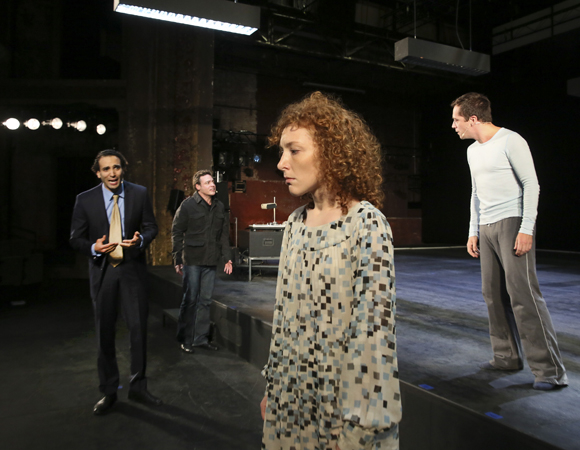Angels in America

(© Richard Termine)
Is it still Angels in America if the angel doesn't come crashing through the walls at the end of the epic play's first part, Millennium Approaches? What if that same angel isn't an angel at all, but instead a male nurse who strolls onstage and offhandedly delivers the otherworldly message "Greetings, prophet, the great work begins"? Those were some of the questions to ponder during the 45-minute dinner break of Ivo van Hove's radical reinterpretation of Tony Kushner's landmark AIDS-themed drama, which played a brief run at Brooklyn Academy of Music this past weekend.
Van Hove's production, which originated at the Toneelgroep Amsterdam in 2008, strips the two-part drama down to its bare essential: language. Scenographer Jan Versweyveld provides no set, not even tables and chairs (though there are a few props, namely an IV pole, a stack of vinyl records, and a turntable). The costumes, by Wojciech Dziedzic, are all street clothes, but not ones that define the period in which the show takes place, 1980s New York City. The text itself, translated into Dutch by Carel Alphenaar and performed in that language, is just as pared down and performed at light speed. Put together, the three-act Millennium Approaches and the five-act part two, Perestroika, usually have a running time of nearly seven hours. Here, with judicious cuts, each play clocks in at barely two.
The story is still there. Prior Walter (Eelco Smits) is still a man in his prime, cut down by the mysterious gay cancer that is plaguing New York City; he's still unceremoniously dumped by his boyfriend Louis (Fedja van Huêt), who falls into the arms of closeted Reaganite Mormon Joe Pitt (Marwan Kenzari). Joe's wife, Harper (Hélène Devos), is just as terrified at being abandoned in Manhattan. Roy Cohn (Hans Kesting), the homophobic lawyer who is diagnosed with AIDS and tries to cover it up as liver cancer, is as evil as can be, even when he's haunted by the ghost of Ethel Rosenberg (Marieke Heebink), whose execution he had a hand in. That pesky angel (Alwin Pulinckx) is still hanging around taunting Prior.
This take on the play is a lot less revelatory than it is distancing. One of the hallmarks of Kushner's play is just how much you come to care about the conflicted souls at its center, even the vile Roy. The earthbound realism and humor of Millennium Approaches is lost in the depths of this time-warped universe, where actors stroll onto a bare stage with no walls and spit out their lines rapid-fire with little emotion. How can a hilarious line like "Very Steven Spielberg," which comes when the Angel crashes and destroys Prior's apartment like in an '80s action movie, register and get a laugh when nothing is being thrown about? Perestroika, intelligently edited in a way that makes it more consistent, works far better, mainly because the reality is heightened to the point that it almost becomes fantasy.
More jarring is seeing a white actor play the black drag queen Belize, Prior's dear friend and Roy's nurse, which is so ingrained in the text as a nonwhite role (though the actor, Roeland Fernhout, is wonderful). Conversely, there's a gloriousness to the stage pictures van Hove creates, especially when Roy Cohn's body is splayed out on stage as projections of waves crash behind him (Tal Yarden designs the videos).
The actors still bring warmth to the characters, though it's hard not to wish they occasionally slowed down to let the beauty of the language come to light. Kesting is a painstakingly repugnant Roy Cohn, and what's remarkable about his performance is how much he is able to make us care for this awful, awful man as he meets his doom. Heebink brings an ethereal presence to Ethel Rosenberg, and, with a careful change in posture, fully inhabits the role of Joe's Mormon mother, Hannah. The standout, though, is the magnetic Devos as Harper, alternately sympathetic and cold, completely insane and yet perhaps the sanest one onstage. It's a performance that you'd love to see in a production that restores the powerful drama's bigness.










